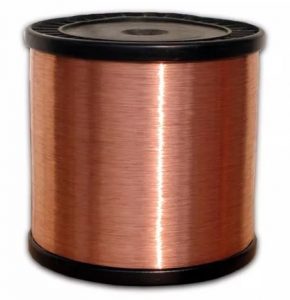Copper wire is a type of wire made primarily from copper, a highly conductive metal known for its excellent electrical and thermal conductivity. Copper wire is widely used in various applications due to its advantageous properties. Here are some key features and uses of copper wire:
- Electrical conductivity: Copper wire is highly conductive, making it an excellent choice for electrical and electronic applications. It allows the efficient flow of electricity, minimizing power loss and ensuring reliable transmission of electrical signals. Copper wire is commonly used in electrical wiring, power distribution, motors, transformers, and other electrical components.
- Thermal conductivity: Copper has exceptional thermal conductivity, meaning it can efficiently conduct heat. This property makes copper wire suitable for applications where heat dissipation is crucial, such as in electrical motors, heat exchangers, and HVAC systems.
- Ductility and malleability: Copper wire is highly ductile and malleable, allowing it to be easily bent, twisted, and formed into various shapes without breaking. This property makes it ideal for applications that require flexibility and ease of installation, such as in electrical wiring and circuitry.
- Corrosion resistance: Copper wire has good resistance to corrosion, enabling it to withstand exposure to moisture, humidity, and various environments. It is commonly used in outdoor applications, such as in overhead power lines, because of its ability to resist degradation due to weather conditions.
- High melting point: Copper has a relatively high melting point compared to many other metals. This property makes copper wire suitable for applications that involve high temperatures, such as in motors and electrical connections.
- Antibacterial properties: Copper has natural antimicrobial properties, which can help reduce the survival and spread of bacteria and other microorganisms. Copper wire is used in certain healthcare applications, such as in hospital equipment, touch surfaces, and antimicrobial coatings.
Common applications of copper wire include:
- Electrical wiring: Copper wire is extensively used for electrical wiring in residential, commercial, and industrial buildings due to its excellent conductivity, flexibility, and corrosion resistance.
- Electronics and telecommunications: Copper wire is widely employed in the manufacturing of electronic devices, circuit boards, telecommunications equipment, and data transmission cables.
- Power generation and distribution: Copper wire is used in power plants, substations, and electrical grids for power generation and distribution purposes.
- Motors and transformers: Copper wire is an essential component in motors, generators, transformers, and other electrical machines due to its conductivity and thermal properties.
- Automotive industry: Copper wire is utilized in the automotive industry for wiring harnesses, electrical systems, and automotive components that require reliable electrical connections.
- Jewelry and art: Copper wire is popular in jewelry making, wire-wrapping techniques, and artistic creations due to its malleability and aesthetic appeal.
Overall, copper wire’s combination of high electrical conductivity, thermal conductivity, ductility, and corrosion resistance makes it an ideal material for numerous applications across various industries.

